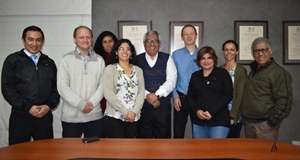he project «Monitoring protected areas in Peru to Increase forest resilience to climate change (MonANPerú)» led a series of discussion and practical training sessions in Lima, from July 23 to 26. The goal was to present progress on the project’s work to give scientific support to protected area (PA) management in Peru using data from a network of more than one hundred permanent forest plots, located in 12 PAs.

The project aims to support monitoring of forest health across the whole system of protected areas, and promote sustainable management of specific natural resources, such as the aguaje (Mauritia flexuosa) palm. For example, according to the rate of biomass change calculated from the plot data, in the last few decades, intact forests in the Amazon-Andes region of Peru have acted as a carbon sink, absorbing more carbon from the atmosphere than they release. This finding highlights the importance of protected areas for implementing international agreements that Peru has signed related to climate change mitigation.
MonANPerú has also helped to design a monitoring system of the health of harvested stands of the aguaje palm: data on the abundance and the proportion of female, fruit-bearing palms in our plots, provide a base line for understanding the level of degradation of these ecosystems.
An important achievement of the project is that these results have been implemented in the operational plans of the protected areas and in the new online Environmental Monitoring System of the Peruvian Protected Areas Authority (SERNANP).
The initial meeting was attended by Dr. Pedro Gamboa, head of SERNANP, Benjamin Lau, Director of Strategic Development, Ing. José Carlos Nieto, Director of Management of Natural Areas, and specialists Edgar Vicuña and Lourdes Ruck of SERNANP, Dr. Euridice Honorio (Instituto de Investigaciones de la Amazonia Peruana; IIAP), Rodolfo Vásquez and Rocío Rojas of the Missouri Botanical Garden, Dr. Tim Baker, coordinator of MonANPerú, Dr. Karina Banda, Dr. Martin Sullivan and Prof. Oliver Phillips of the University of Leeds. Subsequent sessions were attended by 40 people from ten institutions, including NGOs, universities and government institutions such as the Peruvian Ministry of the Environment, Forest Service, Meteorological Service, Peruvian Geophysics Institute, and the Wildlife Conservation Society.
MonANPerú is funded by the Gordon and Betty Moore Foundation, and the events were funded by the Royal Society (Global Challenge Research Fund) and the Moore Foundation.
